
views
Additions to the Diet
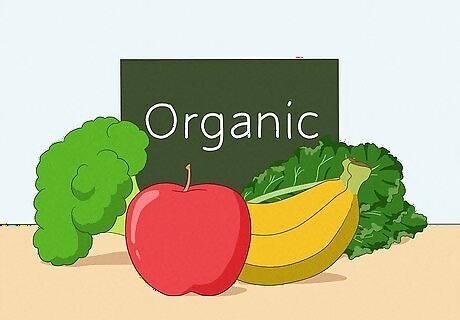
Eat more organic foods. While pesticides and similar chemicals used in food production do not necessarily produce more estrogen, they do have estrogen-like effects when your body absorbs them. Eating organic food will prevent these chemicals from entering your body.
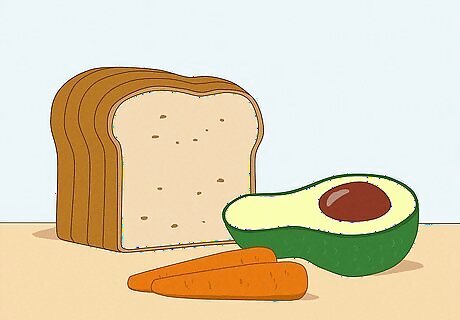
Get more fiber in your diet. Fiber may lower circulating estrogen concentrations. Fiber-rich foods include fruits, vegetables, and whole grains.
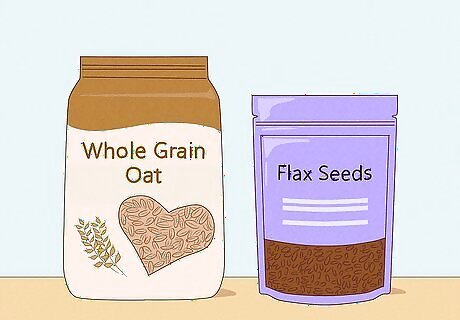
Know which foods are polyphenols. Polyphenols are derived from plant sources of food. Current research suggests that they help inhibit the action of estrogens. Flax seeds can be especially beneficial. They contain the polyphenol lignan, which can counteract the effects of estrogen in the body and interfere with estrogen production. They do contain plant derived estrogens known as "phytoestrogens," however, so you should not eat them in excess. Other seeds, like chia and sesame, have similarly beneficial properties. Many unrefined grains also contain large amounts of polyphenols. Some of the best whole grains include wheat, oats, rye, corn, rice, millet, and barley.
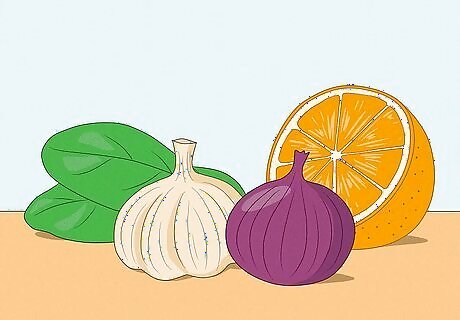
Look for foods containing sulfur. Sulfur can help detoxify the liver by getting rid of substances that cause liver damage. As a result, the liver becomes more productive. Since the liver is responsible for metabolizing and breaking down estrogen in the body, a healthy liver can help decrease estrogen. Sulfuric foods include onions, leafy green vegetables, garlic, egg yolks, and citrus fruits.
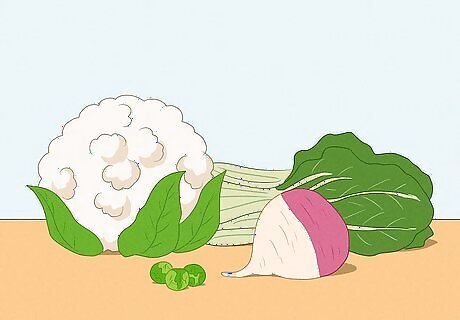
Put more cruciferous vegetables in your diet. Cruciferous vegetables have high levels of phytochemicals, and these phytochemicals may inhibit the action of estrogen. A few beneficial cruciferous vegetables include broccoli, cauliflower, Brussels sprouts, bok choy, kale, collard greens, turnips, and rutabagas.
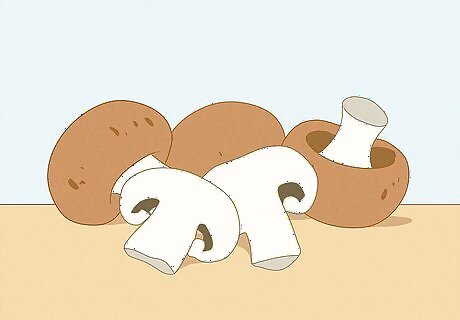
Eat more mushrooms. Mushrooms contain a phytochemical that blocks the enzyme aromatase from converting androgen into estrogen. By eating more mushrooms, you may restrict this conversion process and decrease estrogen in the body.

Consume red grapes. The skin of a red grape contains a chemical known as "resveratrol," and the seeds contain a chemical called "proanthocyanidin." Both of these chemicals have been known to help block the production of estrogen. Since both the seeds and skins have estrogen-blocking properties, you should eat red grapes that still have seeds rather than choosing seedless varieties.
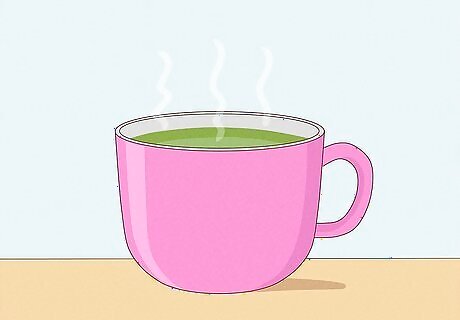
Drink green tea. Green tea contains phytochemicals which may help reduce estrogen production in the body. Research is still in its early stages regarding this notion, but early results appear promising.
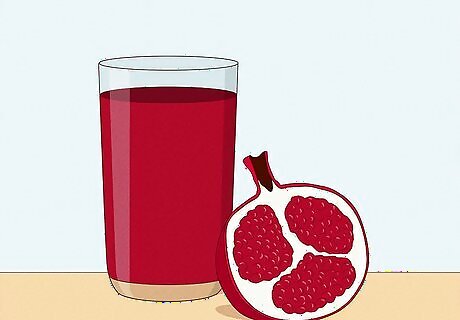
Consume pomegranates. Pomegranates contain phytochemicals, as well. As noted earlier, phytochemicals are thought to have estrogen-blocking properties. In addition to eating pomegranates fresh, you can also drink pomegranate juice and juice blends to obtain the same health benefits.
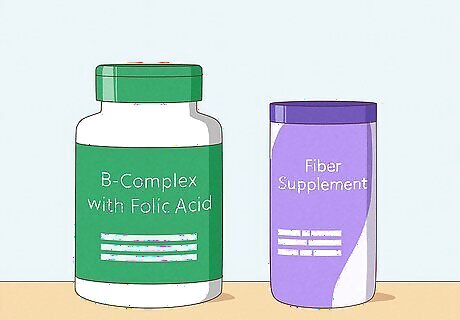
Take the right vitamin supplements. Certain vitamins and minerals can help the body dispose of estrogen. Dietary supplements should never be completely relied upon, but including them in your routine can still be a wise decision. Take a 1 mg folic acid supplement and a B-complex vitamin to help improve your liver function. This can be especially helpful if you drink alcohol on a regular or semi-regular basis. Bacterial imbalance can interfere with the elimination of estrogen from the body, but probiotics help balance your digestive tract. Take a daily probiotic containing 15 billion units. Keep the capsules refrigerated and take one or two twice daily on an empty stomach. Consider taking a fiber supplement to help boost your intake of dietary fiber. Taking a standard multivitamin on a daily basis can be a good idea. These supplements contain zinc, magnesium, vitamin B6, and other nutrients, and these nutrients can help break down and eliminate estrogen in the body.
Subtractions to the Diet
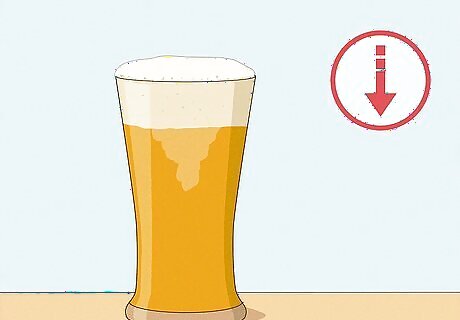
Consume less alcohol. Alcohol can increase estrogen levels in the body. If you have borderline high estrogen levels, limit your alcohol consumption to one glass per day or less. If you are already experiencing estrogen dominance, however, cut alcohol out of your diet completely. Alcohol contains estrogen-like substances (phytoestrogens) derived from the plants that are used to make the alcohol. Such substances have been found to act as estrogens in mice and humans.
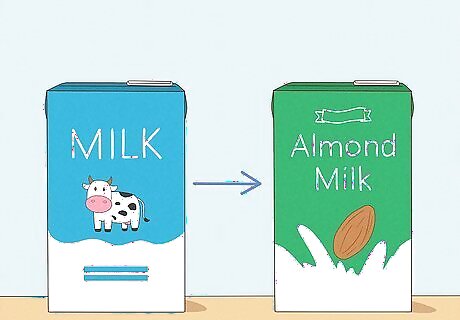
Limit your dairy intake. Roughly 80 percent of estrogens acquired through diet come from cow's milk and dairy products made with cow's milk. Opt for non-dairy milk products, like almond milk or rice milk, instead. Cows are often milked during pregnancy, when their estrogen levels are highest, which is why cow's milk can contain such high doses of estrogen. When you do consume dairy, choose helpful dairy sources. Yogurt can be especially beneficial since it contains probiotics.
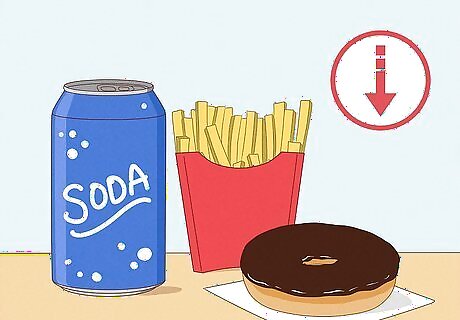
Cut down on junk food. Caffeine, fat, and sugar can all increase estrogen levels in the body, so you should limit these foods as much as possible.
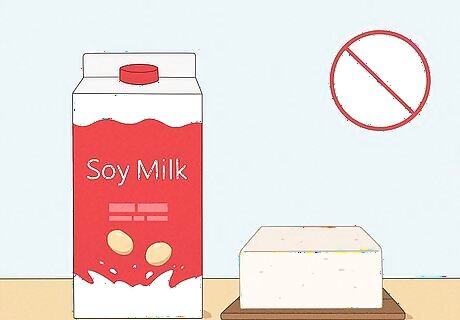
Avoid unfermented soy products. Soy contains plant compounds called "isoflavones" that mimic estrogen, so if you have high estrogen levels in your body, consuming unfermented soy can aggravate the estrogen's effects. Unfermented soy products include tofu and soy milk.
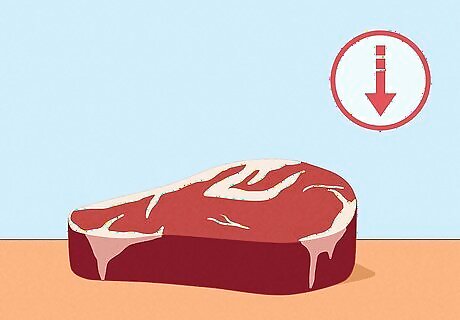
Consume less red meat. Red meat can contain hormone additives, and these additives may possibly boost estrogen levels in your body. When you do eat meat, look for meat labeled as “organic” or “natural.” Consuming this meat will still cause you to consume the estrogen left over from the animal's natural stores, but you will not consume any abnormally excessive amounts of estrogen this way.
Lifestyle Changes
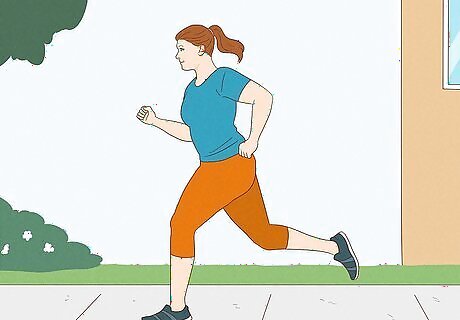
Exercise more often. In particular, moderate to high intensity exercises have the greatest impact on estrogen levels. Try to get 15 to 30 minutes of moderate exercise each day to begin lowering your estrogen. Research suggests that postmenopausal women should get at least three hours of moderate exercise per week if they want to significantly reduce the amount of estrogen circulating through their bodies. Instead of doing muscle toning exercises, focus more on aerobic exercise, like walking, running, and cycling. Exercise can also lead to weight loss. Since estrogen can hide out in the body's fat cells, fewer fat cells can mean less estrogen.
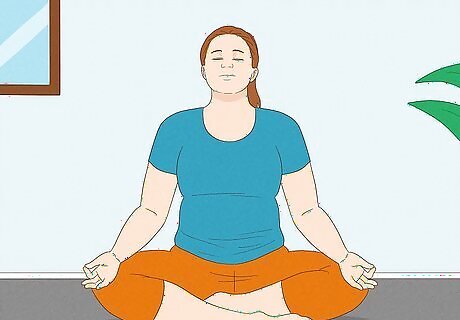
Stress less. In order to deal with stress, the body burns large amounts of progesterone and creates cortisol, the stress hormone. A by-product of this process is a relative excess of estrogen. It might seem impossible to cut stress out of your life completely, but there are things you could do to try reducing stress in your life. Remove any avoidable yet predictable source of stress you face on a regular basis. To counteract the effects of unavoidable stress, find activities that help you relax—meditation, reading, light exercise, therapy, and so on.
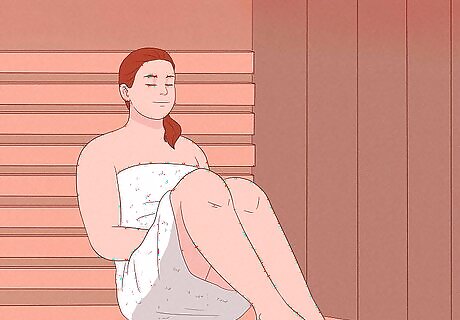
Try an infrared sauna treatment. Infrared sauna treatments are a popular detoxification practice. These treatments are believed to help balance hormones by encouraging fat cells in the body to flush out the estrogen stored there. During an infrared sauna, infrared radiation safely heats up your skin, causing you to produce more sweat. Sweat cools the body, but it also releases toxins built up in the body, including excess estrogen.
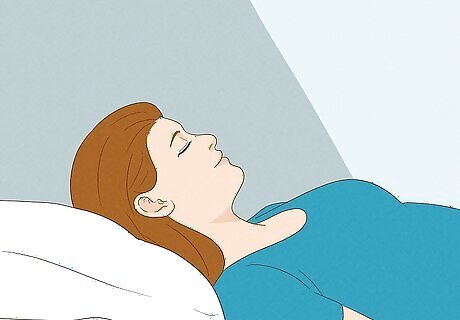
Get plenty of sleep. Poor sleep habits can reduce the amount of melatonin hormone in your body. Melatonin helps protect your body against estrogen dominance so decreased melatonin can lead to increased estrogen. Try to get seven to eight hours of sleep each night. Keep the room as dark as possible as you sleep. Research often suggests that darkened rooms allow you to sleep more deeply, and a deeper sleep will help you produce more melatonin.
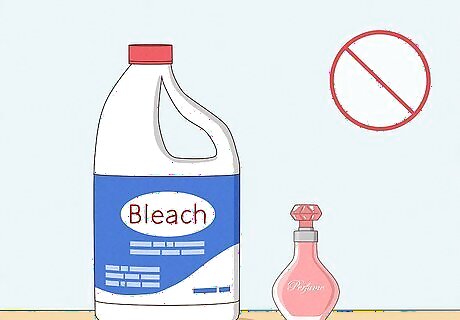
Avoid handling items that could contain toxins. In particular, certain plastics and cosmetics can contain xenoestrogens, and these estrogens can find their way into your body when you handle them on a regular basis. Perfumes and perfumed products are one possible threat, and many toiletries contain harmful parabens. Plastic bottles and cups can cause you to consume harmful phthalate. Metal cans can contain high levels of hormone-altering BPAs. Ceiling and floor tile glues can contain dangerous carbons. Gases produced by bleach and strong chemical cleaners can also negatively impact your hormones.
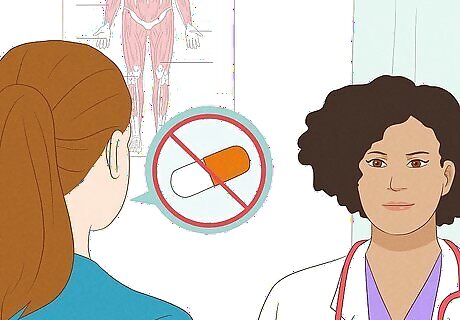
Ask your doctor about stopping certain medications. You should never quit taking any medication without consulting your doctor first. That said, if you are concerned about high estrogen levels in your body, you may want to talk to your doctor about certain medications linked to increased amounts of estrogen and ask if you can limit or avoid them. Antibiotics can kill or damage the helpful bacteria in your digestive tract. That bacteria helps flush estrogen out of your system, so destroying it can cause estrogen to build up.



















Comments
0 comment